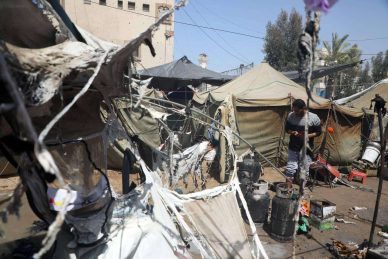GAZA, (PIC)
Since the beginning of the genocidal war on Gaza nearly a year ago, Israel has cut off all sources of electricity to the region amidst ongoing violence and destruction. At the time, Israeli Defense Minister Yoav Gallant announced the cessation of water, electricity, and food supplies to Gaza, referring to the inhabitants as “human animals.”
Meanwhile, airstrikes have relentlessly targeted civilian homes, plunging Gaza into complete darkness. This darkness has deeply complicated daily life due to the population’s total dependence on electricity for all aspects of living.
A longstanding crisis
The electricity issue in Gaza is not new to this war. In 2006, Israeli airstrikes destroyed the only power station in Gaza, plunging the region into a severe electricity crisis that has worsened at various times. Israel has long used electricity as a tool in its blockade, suffocating the population and intensifying their suffering.
Our correspondent reports that the total power blackout began in the first week of the genocidal war on October 7, when Israel cut all electricity lines and closed the crossings, preventing fuel necessary for operating the power station or generators that could provide alternative energy.
Possible alternatives
Determined to persevere, Palestinians have been searching for alternatives to overcome this ordeal, despite the ongoing war and killings. One of these alternatives is solar panels, which have become a popular solution. However, demand has caused prices to skyrocket. Engineer Hassan Abdul Wahab, an expert in alternative energy systems, tells our correspondent that solar panel prices have increased many times over. A panel with a 660-watt capacity, which used to sell for $200 before the war, now costs over $1,300.
He added that solar panels have become scarce, as Israel has blocked their entry through border crossings since the war began. The prices of cables, brakes, and large batteries have also seen significant increases, sometimes reaching ten times their original price.
According to Abdul Wahab, the cost of a medium-sized solar energy system, which was around $4,000 before the war, has now risen to more than $20,000.
Charging points
Palestinian Mahmoud Al-Maghrabi, who set up a charging station and began selling ice water using solar panels he owned before the war, says these alternatives cannot fully replace electricity. Gaza has faced an electricity crisis for nearly 20 years, but the situation has worsened dramatically since this war began, leaving homes without any power.
Al-Maghrabi emphasizes that life cannot continue without electricity, asking, “We live in the age of globalization and the digital revolution, yet we still have no electricity. What kind of terrorism and criminality is this?”
Gaza’s electricity needs range between 400 and 500 megawatts, peaking at 600 megawatts during winter and summer. However, even before the war, the available power from Egyptian and Israeli sources, combined with local production, never exceeded 250 megawatts, resulting in a deficit of 50-70%. This shortage was reflected in power distribution schedules, which have been completely halted for nearly 11 months due to the cessation of all electricity supplies.
Fuel blockade
In addition to cutting off electricity and blocking alternative energy supplies, Israel has also prevented fuel deliveries needed to run hospital generators, which are crucial for various hospitals across Gaza. In some cases, hospitals themselves have been targeted by airstrikes.
Our correspondent reports that during the war, Israel has often targeted buildings with solar panels on their roofs, aiming to destroy anything that might strengthen Palestinian resilience. Due to Israel’s slow and limited fuel deliveries and the steep price increases, it has become extremely difficult for some residents to run their private generators, further compounded by a lack of spare parts.















